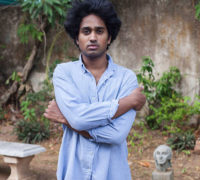By Uditha Devapriya
Directors are neither demagogues nor ivory towers. The worst of them tend to take to the commercial sector, but that does not and will not absolve the few who take the deterioration that results from this as a license to shut themselves up in academia and throw out arty flicks that, while critically well received, alienate their audience. I am no fan of those who intellectualise the cinema. Rehan Mudannayake, fortunately for me, is no fan of them either.
This is his story.
Early life and childhood
He was educated at Elizabeth Moir in Colombo and later at Worth Abbey School in England. In both schools, he derived a love for art that would stay. Predictably, it stayed with him even when he entered the University of Kent, to study film for three years, and the University of Amsterdam, to study not just film but also literature, drama, and musicology. Apparently jazz was one of the subjects he had to study in the latter stream, which he remembers with some justifiable fondness.
In 2012 he left Europe and came back to Sri Lanka. When asked as to why he did so, he replies, “Purely and simply, the desire to make movies in my own country.” He qualifies this: “Besides, I grew up on a diet of films here. So this is where I really began my career.”
What of England?
As for England, he qualifies his admiration for that country’s cinema: “England doesn’t have a vibrant film culture anymore. There’s hardly any continuity in the industry there, quite opposite to what’s happening across the Atlantic.”
What’s missing, he explains, is state support. “I remember David Cameron once publicly stating that all directors in the UK must strive to make more films like Harry Potter. He was probably offering justification for his government’s decision to abolish the UK Film Council. That’s absurd though, quite harrowingly. Forget the fact that not everyone can make or afford to make Harry Potter films. Where’s the youth going to be in the British film industry? I think not addressing this question, especially in the long term, will do more damage than anyone can imagine.”
The principles of the cinema
For his part, Rehan has stuck to principle. He is also eclectic. That is how he can talk about his fascination with Eisenstein and the Russians, Godard and the French, and Spielberg and the Americans with equal vigour and fascination.
“Point is, we can’t really inflate ourselves and think that what we love as film-styles are the best. We need to learn as many of them as we can,” he says, “Which brings me to my second point: if cinema is NOT to remain as a minority art, we need to go beyond a crowd mentality.”
What of his work?
One of his first attempts was a short called Insecxtual, made about three years back and nominated for the top prize at the Mosaic Film Festival in Toronto. Elephant (an adaptation of an Ashok Ferrey short story), was not really a follow-up in that it explored new themes, best left to be discerned by the filmgoer and not revealed by the critic.
The film was, if my memory is correct, screened twice here last year. I missed watching it on both occasions, the first owing to an unfortunate illness and the second owing to another unfortunate illness. From what I have heard, however, I can say this much: Rehan has tried to probe into the fears, anxieties, and aspirations of the Colombo bourgeoisie.
His second film, Ladies Night, was premiered at the Lionel Wendt Arts Centre on Thursday, December 8 last year. The cast, which included Arun Welandawe-Prematilleke, Kinita Shenoy, Lasantha David, Sakshin Haran, Savera Weerasinghe, Vindhya Fernando, and Savithri Rodrigo, were (typically) quite young.
Ladies Night is relatively short. I believe the plot tells it all: “A regular Wednesday night out in Colombo amongst three friends – Fiona, Rajinda, and Sulaiman – takes a twisted turn when they are paid a visit by an unsavoury visitor. A dark, fast-paced short film, Ladies Night is the story of a disturbed man who obsessively stalks and harasses his ex-girlfriend.” I asked Rehan to elaborate on this without revealing spoilers, and in one go (well, almost) he summed it all up: “We live in a society that shuts out the most basic flaws that beset us.”
I sense that the same themes embedded in his previous work comes out here as well, and I am not wrong: in particular, our inability to recognise social ills when they confront us, and how, despite the contextualised plot of the film (as I mentioned, it delves into the lives of the Colombo elite), this trait of ours is relevant to the rest of our small country. I put this to Rehan, who agrees almost at once: “Yes, it’s rooted in a particular milieu. But then that doesn’t belittle its relevance to the many other communities resident elsewhere.”

Final words
I suppose the subject of any article deserves the last word. Here’s what Rehan has to say, hence: “We need to stop the cinema from being institutionalised. For this, we must seek cooperation from critics who know what they’re writing about and audiences who appreciate films for what they are. We need truly independent directors. But will we ever get them? That is my question for you.”

